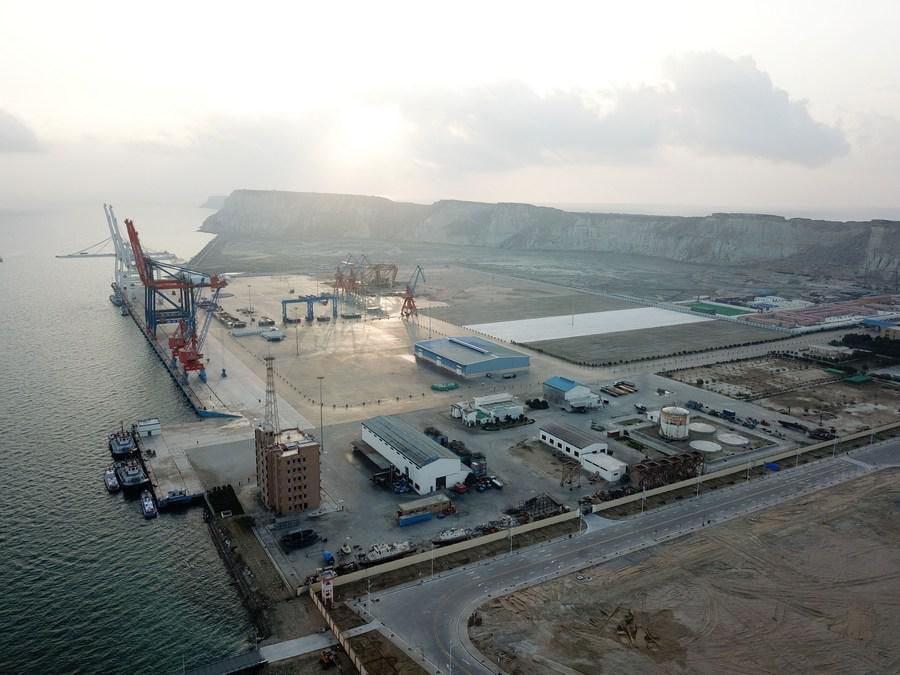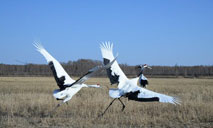6 years on, Xi's Pakistan visit booms development, friendship with shared future
-- Six years after Chinese president's state visit, a closer China-Pakistan community with a shared future is becoming a reality and setting a fine example for the rest of the world.
-- According to data by the Chinese Embassy in Pakistan, the China-Pakistan Economic Corridor has helped Pakistan rake in 25.4 billion U.S. dollars in foreign direct investment since inauguration, offering more than 75,000 jobs to local people.
--The special friendship between China and Pakistan is a historical choice, and is deeply rooted in the hearts of the two peoples, who have always extended a helping hand to each other in times of need.
--The mutual support and bilateral cooperation in the face of huge challenges have shown the world the true meaning of an all-weather friendship.
ISLAMABAD, April 19 (Xinhua) -- For hundreds of years, the lofty Karakoram mountain range has never been the hurdle between the two ancient civilizations of China and Pakistan, but rather a witness to the ever-deepening friendship between the two peoples.
The rolling mountain observed a new height of friendly exchanges between the two countries in 2015 when the plane taking Chinese President Xi Jinping for a two-day state visit to Pakistan flew over it.
During the visit, the two sides forged their all-weather strategic cooperative partnership, and mapped out strategic arrangements and a long-term plan for future bilateral development.
Six years on, benefits of the fruitful visit thrive across the South Asian country. A closer China-Pakistan community with a shared future is becoming a reality and setting a fine example for the rest of the world.

A train for the Orange Line arrives at a subway station in Lahore, Pakistan, Oct. 26, 2020. (Xinhua/Liu Tian)
CPEC's NEW CHAPTER
Back to 2015, Pakistan was deeply-marred by terrorism, and few countries in the world were willing to invest in the country, said Mushahid Hussain Syed, chairman of the Pakistani Senate's standing committee on foreign affairs. The South Asian country was looking forward to an economic take-off to stabilize its society.
"China and Pakistan need to align development strategies more closely to realize the dreams of our peoples," Xi said in a signed article published ahead of his Pakistan visit.
During the visit, the two sides signed more than 50 cooperation deals, and agreed to center the development of the China-Pakistan Economic Corridor (CPEC) with four key areas namely the Gwadar Port, transport infrastructure, energy and industrial cooperation.
The CPEC blueprint is now a reality. Three major coal-fired power plants with world's top environment friendly technologies have generated more than 71.5 billion kilowatt-hours of electricity since they were combined to the grid, ending Pakistan's history of power outages of an average of 12 hours per day.
In 2020, major CPEC energy projects generated about one-third of the total electricity injecting into the national grid, said Chinese Ambassador to Pakistan Nong Rong. With planned hydropower plants including Karot and Suki Kinari under construction, Pakistan's energy structure will be further improved in the near future.

Photo taken on Nov. 18, 2019 shows the expressway section from Havelian to Mansehra under the Karakoram Highway Phase Two project in Pakistan's northwest Khyber Pakhtunkhwa province. (Xinhua/Liu Tian)
The CPEC has also enhanced connectivity. The Karakoram Highway Phase Two project, along with the Sukkur-Multan Motorway, CPEC's largest transport infrastructure project, has connected the heartland of the country with its remote northern region and financial center in the south. The eco-friendly Orange Line metro train in Pakistan's cultural center Lahore has served over 10 million passengers within six months.
Facing the Arabian Sea and the Middle East, the re-functioned Gwadar Port has welcomed Afghan transit cargo, facilitating goods movement in the region and "helping make Pakistan the hub of transit trade in the region," said Pakistani President Arif Alvi. With a new international airport and a coastal expressway linking the airport to a newly-built free trade zone, Gwadar is sailing towards the dream of becoming a "New Dubai" in Pakistan.
According to data by the Chinese Embassy in Pakistan in March, the CPEC has helped Pakistan rake in 25.4 billion U.S. dollars in foreign direct investment (FDI) since inauguration, offering more than 75,000 jobs to local people. In fact, China has been Pakistan's largest source of FDI for the past seven years, and its largest trading partner over the last six years.
Xi's visit was very important, and what the two countries planned at that time "is in the pipeline, is happening, is going on," Alvi told Xinhua in a recent interview.

Photo taken on Jan. 29, 2018 shows a view of Gwadar Port in southwest Pakistan's Gwadar. (Xinhua/Ahmad Kamal)
ALL-WEATHER FRIENDSHIP
"My friend's lovely image dwells in the mirror of my heart; I tilt my head slightly, and here it comes into my sight." Xi quoted an Urdu poem in the signed article to describe what Pakistan is like in his own heart.
The special friendship between China and Pakistan is a historical choice, and is deeply rooted in the hearts of the two peoples, who have always extended a helping hand to each other in times of need.
When the devastating earthquake struck China's Wenchuan in 2008, Pakistan shipped its entire reserve of tents to China. When Pakistan was hit by a severe flood in 2010, China dispatched its largest ever medical team to the South Asian country.
Amid the raging COVID-19 pandemic, Alvi wrote a letter to Xi to express consolations to the Chinese people, and visited China in March 2020. Pakistan's National Assembly and Senate have both passed a resolution on offering full support to China's anti-pandemic fight.
In return, China has sent medical teams and donated anti-epidemic materials to Pakistan. Besides, Pakistan became the first country to receive COVID-19 vaccine aid from China, and took part in the Phase III trial of a Chinese COVID-19 vaccine, ensuring more safety for its citizens while gaining first-hand medical experiences.
"In every situation, on every step, our Chinese counterparts are always providing us firm support," recalled Omeira Naseer, supervisor of the vaccine trial at Shifa International Hospital in Islamabad. "We have a very nice experience with our Chinese counterparts."

A handover ceremony of a batch of China-donated COVID-19 vaccine is held at Noor Khan Air Base near Islamabad, Pakistan, Feb. 1, 2021. (Xinhua/Liu Tian)
The mutual support and bilateral cooperation in the face of huge challenges have shown the world the true meaning of an all-weather friendship.
"By all-weather, we mean that our two countries will always move ahead together rain or shine. This description of China-Pakistan partnership is a most appropriate one, as it aptly defines the all-weather friendship and all-round cooperation between China and Pakistan," Xi said in 2015 at the Parliament of Pakistan.
As this year marks the 70th anniversary of the diplomatic ties between China and Pakistan, Alvi said the anniversary will be a new starting point, and the all-weather friendship between the two countries will be stronger in the future.
SHARED FUTURE
"Over the years, thanks to the nurturing of generations of leaders and people from all sectors of both countries, China-Pakistan friendship has flourished like a tree growing tall and strong," Xi said in the signed article.
Now younger generations have taken over the relay baton of exchanges. The Chinese education sector has welcomed an increasing number of Pakistani students, while more and more people in Pakistan are learning Chinese. Besides, there have also been closer cooperation between sister cities, media outlets and think tanks from both countries.
During the state visit six years ago, Xi noted that the friendship between China and Pakistan is based on trust and mutual support. "Our friendship is a pacesetter for amicable relations between countries."
Pakistan was the first Islamic country to establish diplomatic ties with China. Since then, the iron-clad relationship has set a good example of mutual learning and friendly cooperation between different civilizations.

Students attend a Chinese language class at a campus of the Roots Millennium Schools in Islamabad, Pakistan, on March 11, 2021. (Xinhua/Ahmad Kamal)
China has always taken the development of its ties with Pakistan as a priority in its neighboring diplomacy, while Pakistan continues to give China top priority in its foreign policy. The two sides firmly support each other on issues concerning their respective core interests.
The high degree of mutual trust has enabled the two sides to keep a close communication and coordination at international and regional fora like the United Nations, the Shanghai Cooperation Organization and the South Asian Association for Regional Cooperation.
"Committed to building a China-Pakistan community of common destiny, we cooperate to expand our converging interests and strive for common development," said Xi in the signed article.
Noting that China-Pakistan relations "have gone well beyond the bilateral context," Xi during his state visit in 2015 called on both sides to "increase coordination and collaboration on major regional and global issues."
Pakistani Foreign Minister Shah Mahmood Qureshi said in August last year that the all-weather strategic cooperative partnership between the two countries is beneficial to international and regional peace and stability.
The idea of "building a community with a shared future for mankind" proposed by Xi is the only option to defeat global challenges, said Alvi.
Photos
Related Stories
- Xi stresses building world-class universities to serve nation in visit to Tsinghua
- Xi attends video summit with French, German leaders
- CPEC SEZ to create over 200,000 employment opportunities for Pakistan: official
- Xi's speech marking 95th founding anniversary of CPC to be published
- Xi receives credentials of 29 ambassadors
Copyright © 2021 People's Daily Online. All Rights Reserved.










